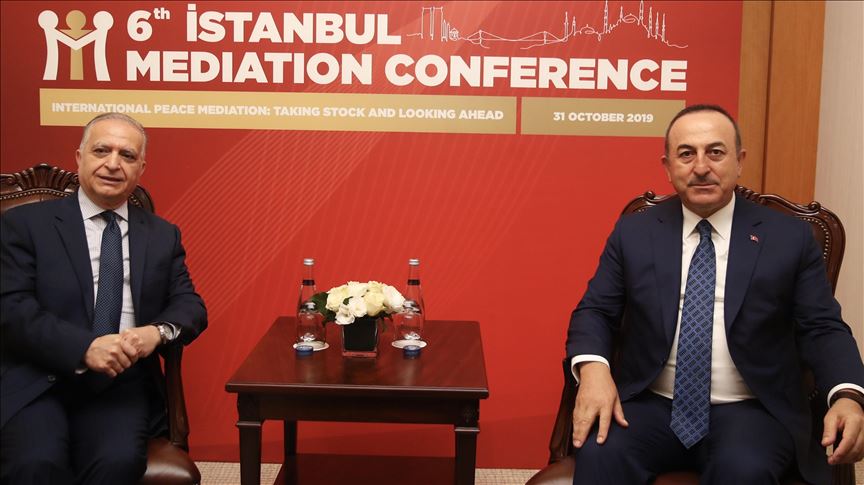Top Turkish diplomat: Diplomacy crucial for peace
Turkish foreign minister speaks at 6th Istanbul Mediation Conference in Istanbul
 Turkish Foreign Minister Mevlut Cavusoglu (R) meets Foreign Minister of Iraq Mohamad Alhakim in Istanbul, Turkey on October 31, 2019. ( Fatih Aktas - Anadolu Agency )
Turkish Foreign Minister Mevlut Cavusoglu (R) meets Foreign Minister of Iraq Mohamad Alhakim in Istanbul, Turkey on October 31, 2019. ( Fatih Aktas - Anadolu Agency )
ISTANBUL
"Effective mediation" and "preventive diplomacy" are crucial tools in tackling ongoing conflicts taking place around the world, Turkey’s foreign minister said Thursday.
Speaking at the sixth Istanbul Mediation Conference in the Turkish metropolis of Istanbul, Mevlut Cavusoglu said: "We are witnessing the emergence of a new set of challenges, including terrorism, radicalism, climate change, poverty, extremism, xenophobia, Islamophobia, and antisemitism."
Underlining that that conflict has become more complicated, Cavusoglu said: "Conflict prevention and resolution efforts have to match the complexity of conflicts worldwide."
"The need for effective mediation is greater than ever before," Cavusoglu stressed, adding that "preventive diplomacy and conflict resolution became more crucial."
He cited the famous century-old motto, "Peace at Home, Peace in the World," first articulated by Mustafa Kemal Ataturk, the founder of the Republic of Turkey.
"This is not a simple preference, but a necessity given Turkey’s location at the epicenter of a geography plagued by a great many conflicts," Cavusoglu stressed.
Highlighting that Turkey has undertaken various mediation and facilitation efforts and developed numerous regional cooperation initiatives, he said, "A decade ago, we launched the Mediation for Peace Initiative together with Finland at the United Nations."
"Today, the UN Friends of Mediation Group has 59 members representing all continents, regions and major international organizations.
"Over the past 10 years, this group made critical contributions to mediation, such as helping the adoption of four UNGA [UN General Assembly] Resolutions on mediation, and the preparation of three UN guidelines on mediation," he added.
Cavusoglu stressed that this "surge in diplomacy for peace" elevated the place of mediation and conflict prevention in the UN.
"This is a major service for global peace and stability," Turkey’s top diplomat said.
Addressing UN Secretary-General Antonio Guterres, Cavusoglu concluded, "We support your efforts and truly appreciate your presence here today."
Clear success
Citing the challenges in such places as Syria, Yemen, Libya, the Sahel, and the Horn of Africa, Guterres said, “We need to mobilize mediation efforts at all levels to address them.”
“Mediation is part of our efforts to address both the root causes and consequences of conflict, particularly at the local level. Post-conflict peace-building, including reconciliation, transitional justice, and reconstruction, is vital to prevent violence recurring,” he said.
On the conflict in Syria, he said, “As the tragedy in Syria grinds on for an eighth year, with civilians paying the highest price, there could be no clearer illustration of the importance of political solutions to conflict.”
He described Wednesday’s first-ever meeting of the Syrian Constitutional Committee in Geneva as a “landmark, a foundation for progress, and in itself a clear success of mediation.”
“I hope this will be the first step towards a political solution that will end this tragic chapter in the lives of the Syrian people, also to create the opportunity for all Syrians to return to their places of origin, in safety and dignity, to end their status as refugees,” he said.
Hailing “recent efforts to end the fighting in northeast Syria through dialogue,” the UN chief said, “I remain very concerned about the situation in Idlib, and repeat my call for maximum restraint, de-escalation, and the protection of civilians and civilian infrastructure on all fronts in Syria."
In 2018, Turkey and Russia agreed to turn Idlib into a de-escalation zone in which acts of aggression are expressly prohibited.
The Syrian regime, however, has consistently broken the terms of the cease-fire, launching frequent attacks inside the de-escalation zone.
The de-escalation zone is currently home to some 4 million civilians, including hundreds of thousands displaced in recent years by regime forces from throughout the war-weary country.
Syria has been locked in a vicious civil war since early 2011, when the Bashar al-Assad regime cracked down on pro-democracy protests with unexpected ferocity.
Since then, over 5 million civilians have become refugees. Turkey hosts 3.6 million of them, more than any country in the world.
The UN chief also stated that mediation and dialogue are having “positive results” in other countries, particularly on the African continent.
"In Sudan, South Sudan, Ethiopia and Eritrea, Madagascar and the Central African Republic, we see a reduction in conflict and human suffering that is due in part to the efforts of mediators bringing parties together for peaceful dialogue,” he said.
“We must build on this success.”
The sixth Istanbul Mediation Conference had the theme “International Peace Mediation: Taking Stock and Looking Ahead.” The event brought together policy-makers, diplomats, international organizations and NGOs in Istanbul.
Various main aspects of the practice of mediation as well as the connection between emerging technologies and peace efforts were among the topics discussed at the event.


